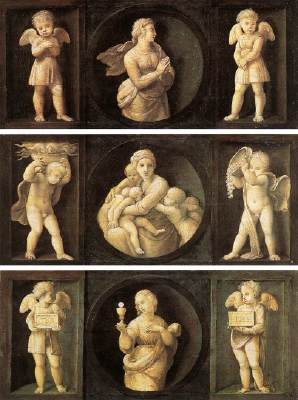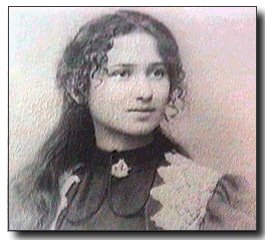On Sundays for the foreseeable future I'll be blogging my way through Saint Augustine's _Enchiridion on Faith, Hope, and Love_.
The triad of Faith, Hope, and Love are called the "divine" or "theological" virtues in contrast to the four "cardinal" virtues of Courage, Moderation, Justice, and Wisdom. It's hard to say just what distinguishes the two types of virtue, but Chesterton somewhere says, in _Orthodoxy I think, but I'm not certain, that the difference is that whereas the cardinal virtues represent what Aristotle--the greatest proponent of virtue theory--calls a "golden mean". That is, the all represent some kind of balance.

(Cardinal Virtues, larger image)
For example, the cardinal virtue of Courage represents a balance between the vice of Cowardice and the vice of being Rash. It is the displaying of a way of being which can be exercised too little or too much. The activity at work in the courageous individual can grow too strong and push the individual past courage into the vice of rashness.

(theological virtues, 1507,
Oil on wood, Pinacoteca, Vatican
larger image)
By contrast, says Chesterton, the divine virtues are all extremist they exemplify a way of being which cannot be lived to much. The activity at work in the loving individual--we're talking about agape/caritas here--has no upper limit, it never becomes a vice no matter how much or to what degree it is practiced.
THE DIFFERENCE BETWEEN HOPE AND FAITH
Augustine thinks that hope and faith are both species of belief. He notes a tendency to use them as if they are nearly the same in some contexts but wishes to distinguish them properly. I want to bracket now the nature of the "belief" of which faith and hope are said to be a species. Of course Augustine recognizes a sense of "faith" in which it is not *mere* belief but something rather more existential. That's not at stake here. Rather, the rough-and-ready idea is that faith is assent to things one can neither observe not *strictly* logically prove on the basis of a genuine authority, in this case the Church and, ultimately God, primarily through the Son. There is very little here of relevance to the issue of the relation of Faith to Reason either affirmatively or negatively.
What formally distinguishes them according to Saint Augustine is that whereas Faith can have for its field both good and evil, past and present, and pertaining to any person, Hope pertains only to the good, the future, and the individual.
Faith:
*good, future (self) - Belief that one will see the beatific vision
*bad, future (self) - Belief that one will incur pain as a result of one's wickedness
*good, past (other) - Belief that Christ rose from the dead
*bad, past (other) - Belief that Judas betrayed Christ
Hope:
*Belief that God will bring me through hard time.
*Belief that I will see loved ones in heaven.
So far the working definition of hope seems to be belief in one's future good. He quotes Romans 8:24-25 in favor of this.
24 For in this hope we were saved. But hope that is seen is no hope at all. Who hopes for what he already has?25 But if we hope for what we do not yet have, we wait for it patiently.
His definition is inferred directly from this verse. It doesn't exactly suggest his definition to me. The verse suggests a notion of hope as patient waiting (one would think some kind of *expectation* would come into the picture somewhere, this might be where he gets "belief").
Here's the OED on hope: "To entertain expectation of something desired; to look (mentally) with expectation." All the other defs also mention expectation or looking toward (ex-pect, after all, just means "to look out for"). The core meaning of expectation is merely "to wait" though today we often speak of expectation as involving some positive judgement of probability. It's plain as day from the earliest uses of the word that it mean no more than to wait. Consider this example: "1609 BIBLE (Douay) Ecclus. xi. Comm., Expect the end of an other mans speach, before you beginne to answer."
By the 18th century the meaning begins to shift to the modern affirmative use (there are some before), then takes hold in the 19th century. 1882 J. H. BLUNT Ref. Ch. Eng. II. 18 If he did similar things, he should expect similar punishment. 1891 Speaker 2 May 533/1 The book is very much what might have been expected from the author.
This raises some questions into which I have very little insight.
*Is Hope just a species of Faith?
*Does Saint Augustine neglect the crucial aspect of *waiting*?
*Just what is the nature of the "belief" involved?
*Is "expectation" the bridge between "belief" and "waiting"? (which brings us back to the first question)
THE RELATIONSHIP BETWEEN HOPE AND LOVE
Saint Augustine makes it clear that he thinks that Hope can only occur in the presence of Love and that Love can only occur in the presence of Hope. He also says that neither can occur without Faith. He doesn't say whether Faith can occur without the others, but one gets the impression that the virtues come as a package. If this is right, then I think it might have profound implications.
This is almost tacked on to the introduction without argument. I haven't had a chance to think about it very deeply yet.
This is a lot to deal with just from one short chapter.







